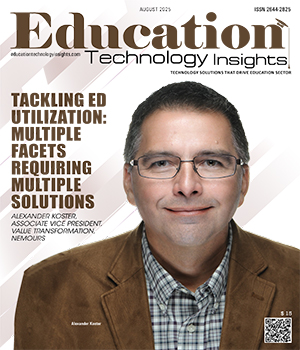THANK YOU FOR SUBSCRIBING
Be first to read the latest tech news, Industry Leader's Insights, and CIO interviews of medium and large enterprises exclusively from Education Technology Insights
Don't Mistake AI for a Pedagogical Approach
Jacob Rosch, Head of Educational Technology, Collège du Léman - International School
Hype, Help and the Human Element Jacob Rosch, Head of Educational Technology, Collège du Léman - International School
Jacob Rosch, Head of Educational Technology, Collège du Léman - International School
Honestly, I don’t think AI is transforming education as radically as some claim and I’m okay with that. The fundamentals haven’t changed. Good teaching still hinges on relationships, motivation, subject knowledge and clarity. AI can enhance specific processes such as grading, content generation and feedback loops, but it hasn’t redefined what it means to teach or learn. If anything, the hype around AI reminds me that tools are only as good as the people using them.
Part of it is overpromising. There’s a tendency in edtech to chase novelty without grounding it in pedagogical need. AI tools often feel like solutions in search of a problem. It won't last long if edtech software doesn’t align with how teachers work or what students need. I've observed schools invest in platforms due to impressive demos, only to abandon them when they realize teachers are not using them.
AI has a place, but it’s not at the center stage. It can support personalization, flagging patterns in student work, or streamlining feedback. But the most impactful changes I’ve seen still come from thoughtful lesson design and strong teacher-student dynamics. A well-structured LMS platform does more to shape meaningful learning than any chatbot or algorithm has so far.
Isn’t AI at least making teachers’ jobs easier?
In some cases, yes, but that’s not the same as changing the job. Automation helps with efficiency, not effectiveness. AI can draft a quiz or summarize a reading but can’t read a classroom, adjust mid-lesson, or build trust with a struggling student. Teaching is deeply human work. Technology should lighten the load but not take over.
“AI can support teaching, but cannot replace the human connection that drives real learning. Tools may improve efficiency, but through empathy, trust and insight, great teachers truly help students grow, think critically and stay motivated”
Schools should not adopt AI as a methodology. AI can support a school’s vision of good learning and teaching. The real question isn’t “What can AI do?” It’s “What does learning and teaching at our school need?” That purpose has to drive the implementation of AI. What I’m seeing in how AI solutions are being promoted is a distraction from that approach.
Final thought, will AI ever “disrupt” education?
Maybe, but if it does, it’ll be because we’ve finally figured out how to embed it wisely into systems that support authentic learning. And even then, I don't see AI as impactful as a real teacher. Teachers know it’s them, not just their content, that helps students learn to think deeply, develop interpersonal skills and follow through on their learning.
Read Also
Localising Curriculum, Globalising Opportunity
Elevating Education with Purposeful Tech-Integration
Digital Transformation with User-Centric Solutions and Collaborative Leadership
Connecting Education and Technology for Lasting Change
Putting Students First in a Global Classroom
Balancing Technology-Driven Teaching with Traditional Learning

I agree We use cookies on this website to enhance your user experience. By clicking any link on this page you are giving your consent for us to set cookies. More info


















